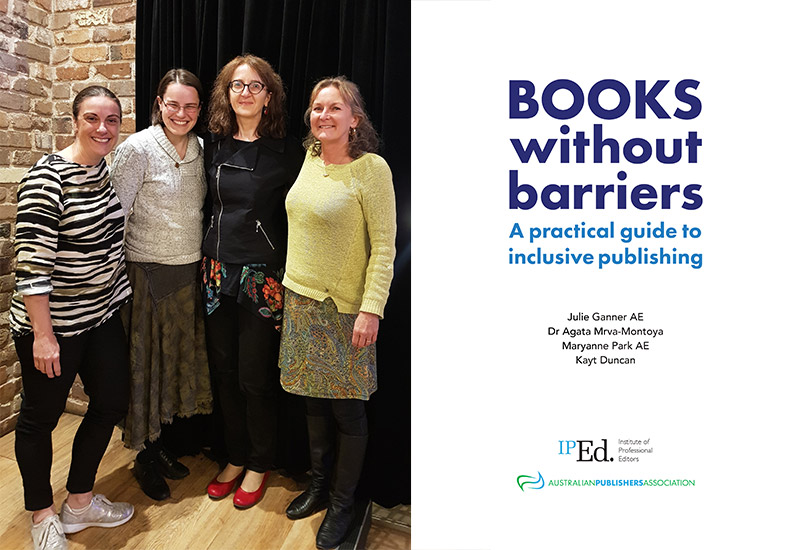By Julie Ganner AE, Chair, Accessibility Initiative Working Party (AIWP)
After over two years’ research, writing and review, Books without barriers was published on 28 April 2023.
Agata, Maryanne, Kayt and I created this guide to continue the aims of the Australian Inclusive Publishing Initiative. The AIPI’s 2019 publication, Inclusive publishing in Australia: an introductory guide, made the legal, social and business case for creating accessible books, but there was no single resource for the book publishing industry that described how to actually do so.
Standards such as the Web Content Accessibility Guidelines (WCAG) are helpful but they do not cover all of the concerns of book publishers. An overreliance on digital standards can also overlook the needs of people using assistive technologies other than screen readers, such as braille and three-dimensional illustration, and of people with disability who still prefer to read books in print formats.
Meanwhile, we found that international resources aimed specifically at the book publishing industry either tended to focus on specific areas, such as image descriptions for educational texts, or to provide similar advice about why accessible books are necessary. We couldn’t find anything that covered the whole book publishing process, and searches for specific information proved very time consuming.
So we decided to create our own resource. Before we knew it, what we had originally envisaged as a short guide had become a 200-page book.
We gave a presentation to launch Books without barriers at the 11th IPEd Editors Conference on Friday 5 May, and an extract from our IPEd conference paper was featured in Books+Publishing. We outlined some of the diverse ways in which people read, and explained how considering the needs of readers with print disability requires thinking beyond reading as a visual activity. This has consequences for the way editors edit, as information must be communicable through sound and touch, not just vision.
We were asked several questions that focused on potential obstacles, such as reluctant publishers or visual aspects that might be lost. We responded that we work in a creative industry that is used to finding different ways to ensure information is communicated effectively. It’s what editors do. We therefore have every confidence that editors are up to the task of ensuring that no one is excluded from reading because of the way they read.
On Sunday 7 May, Agata, Maryanne, Kayt and I also gave a presentation on Books without barriers at the 13th annual conference of the Round Table on Information Access for People with Print Disabilities (Round Table), held in Sydney. It was an exciting afternoon – not least because we have worked together closely for the past two and half years and this is the first time we have all met in person!
The Round Table conference theme was “Universal information access: pathways to an equitable future”. It focused on the themes of advocacy, innovation and practice and provided opportunities for people with print disability, accessible format producers, libraries, publishers, educational institutions, government bodies, technology developers, researchers and other key stakeholders to come together to collaborate, share knowledge and learn together.
In our presentation, we explained why we had written the guide and some of the challenges that publishers face in the transition to born-accessible publications. The audience seemed particularly interested in the chapter on mathematics and science, and offered some helpful ideas and feedback during the Q&A on their experiences with using screen readers.
Sarah Runcie and Libby Baulch from the Copyright Agency came to cheer us on. Sarah and Libby were instrumental in setting up the AIPI in 2016. Books without barriers fulfils one of the AIPI’s key goals by providing detailed information on how to design books from inception to be accessible. In fact, Richard Orme, CEO of the DAISY Consortium, who delivered a keynote speech at the Round Table conference, called for books to be “conceived” accessible.
News articles on Books without barriers were published by the Australian Publishers Association, the Copyright Agency, the Australian Disability Clearinghouse on Education and Training and Inclusive Publishing in May, following the IPEd and Round Table conferences.
We are currently working on additional formats for Books without barriers. Sydney University Press has kindly agreed to fund an EPUB conversion, which is now in progress, and NextSense is working on a braille transcription. We also expect an accessible PDF to be available soon. In the meantime, you can download the accessible Word and basic PDF versions free of charge from the IPEd website.

